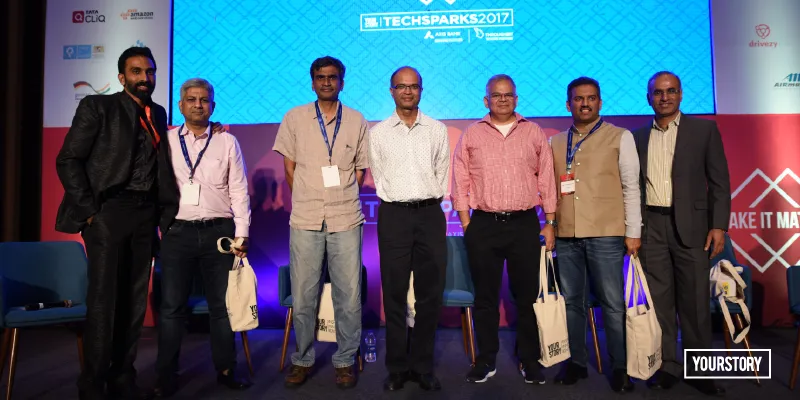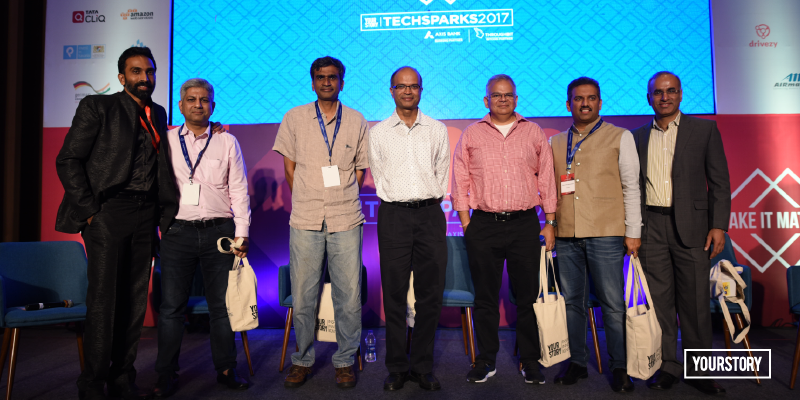In the digital economy, innovation is the only way ahead for startups
India and China are poised to become the tech stack of the world. Corporates at TechSparks push for ‘products with solutions in mind’ to make India a global powerhouse.
The world is no longer how it used to be a decade ago. And it will transform even more dramatically in the years to come.
Consulting firm PWC lists the five mega-trends that will change the world: urban migration, shift in global economic power, demographic and social change, climate change and resource scarcity, and technological breakthroughs.
Recently, in Frankfurt, Volkswagen AG, the $250 billion global automotive giant, announced a $24 billion investment to set up a complete electric vehicle line by 2030. It is now positioning itself as an operating systems company.
With this major announcement, the likes of Toyota, General Motors, BMW and the rest of the automotive world are following up with large investment announcements to move towards part or complete electric platforms in 20 years.
This power play in geopolitics will shift the focus on economies leveraging their knowledge base. Countries like India and China, with their large pool of technology talent, are poised to become the technology stack of the world. The software will be built in India; China will become the hardware hub of the world.

Startups must leverage technology
At TechSparks2017, an esteemed panel of corporate leaders from Microsoft R&D Labs, GE Aviation, NetApp, MindTree, Oracle India and Ideaspring Capital spoke about how Indian startups can leverage technology to help address all the megatrends that will impact economies.
Ajeya Motaganahalli, Director Engineering Programs and Leader of NetApp’s Startup Accelerator, at NetApp India, said, “At the NetApp accelerator programme, we look at people who can solve problems with technology and can execute a business plan.” He said his company gives the startups in the programme access to a global pool of business customers.
The narratives that startups used a couple of years ago were cloud, big data, programmatic decision-making and internet-of-things. Now, they talk about machine learning, artificial intelligence and deep tech. But looking into these narratives showcases that these businesses are doing nothing short of trying to build a story to win business.
Sanket Atal, Group VP- R&D, Oracle Corporation, advised startups to “focus on building the product and not the narrative”. “The narrative follows a good product,” he said, adding that the word innovation is “so wide” that one has to narrow it down to find solutions to a problem.
“To be fair, we have to give every startup an ear because innovation is such a broad spectrum. They should be shown the way, but they should also be able to focus on how software can make it easy for businesses to operate,” Sanket said.
The problems in understanding innovation
The panellists said the problem begins because of the lack of understanding of real-world problems and then figuring out what is really innovative.
Naganand Doraswamy, founder of Ideaspring Capital, said, “I just look at how the software is going to impact a business and how the business will pay for such services. You will know straight away that some of the ideas in India lack the experience and the domain knowledge.”
These domain skills are learnt by working for years in the ecosystem and learning the building blocks of business and technology.
Starting from healthcare and banking to automotive and media, business models are changing due to Narrow AI. The languages, mostly Python and even Java, going into AI and ML are all built out of India, which is why the country is aligning its goals to the world’s quest for a global network of artificial intelligence. Machines are not sentient yet, but we are already in the realm of “Narrow AI”, where mundane tasks such as customer queries and data generation will not need humans anymore.
Startups tend to use the terms ML and AI interchangeably these days. But what are they really?
NVIDIA, the $4.5 billion GPU company, explains in a blog that most of the work in AI today can be termed “Narrow AI”, where certain tasks are better performed by technology. So before we have a sentient being (like in the movie RoboCop), we are already in the era of “Narrow AI”. Today, a connected vehicle uses millions of data points that are processed quickly and present the driver with immediate action.
Machine learning, on the other hand, is termed as an approach to AI. It is nothing but algorithms that make sense of data to determine or predict something, thanks to the processing power of chips today. Before machine learning comes something known as deep learning where engineers try to understand the functions of the brain and how neurons work. So while programming, engineers look at how a machine can function like neurons firing in the brain to perform tasks.
Sriram Rajmani, MD, Microsoft Research Labs India, said: “We see a lot of talent in India which understands this subject and we are able to leverage their strengths to build world-class analytics and cloud-based services.”
He added that today the system to streamline this knowledge, from academia to research to corporate, should be sped up for India to become a global powerhouse in innovation.
Ushering in a digital era
In a matter of a decade, the oil economy will bow out to the digital economy and will realign society with connected mobility and digital information. Already, the digital economy has brought about a realignment of the workforce. With trends such as transportation going electric, those used to oil tune-ups, engine hums and screeching tyres will have to adapt to digital personal assistants, voice-based controls and instant torque.
The digital economy will change the geopolitics of the world.
Regions that have a strong presence in building and integrating software, like India, Israel, China and Eastern Europe, will see more value. China may become the dominant battery manufacturer, while the rest of the world will become the consumer, realigning citizens to the new normal.
Alok Nanda, COO – GE India Technology Centre GM, Engineering - GE Aviation, India, said: “We are already using things like the digital twin – digital mockups to help our clients make the best use of our wind turbines and jet engines. Our platforms can track the rate of failure and suggest prescriptive and predictive maintenance services for clients before a problem happens.”
The AI-based engines, which GE uses, are built by Indian engineers and are part of global R&D teams ushering in a digital era.
Gartner says more than 3 million workers across the world will have a “robo boss” by 2018. It is high time businesses reorient skill development programmes to help mid-level managers stay relevant.
In a recent survey by PWC titled Bot.Me: A revolutionary partnership more than 50 percent of respondents believed AI could help better healthcare, financial management, security and education. Less than 40 percent believed that it could create income and gender equality. In the next five years, jobs such as tutors, travel agents, tax preparers, office and home assistants, health coaches, chauffeurs and general physicians will be replaced.
In this global evolution, India has the talent to become the tech stack of the world and it is big business for IT integrators such as Infosys, Wipro and Mindtree.
Subramanyam Putrevu, Chief Information Officer, Mindtree, said: “We make startups actively participate in our global business as part of our push towards using data and integration services as the centre of the digital economy.”
The panellists said to innovate globally one should build products with solutions in mind rather than the novelty of being innovative. The education system has to catch up to make India a powerhouse. But it can’t be a one-sided effort; even corporates, government and research institutions must combine their strengths to fuel global leadership from India.
(Watch out for a bigger and better TechSparks 2018. Sign up for updates now.)






